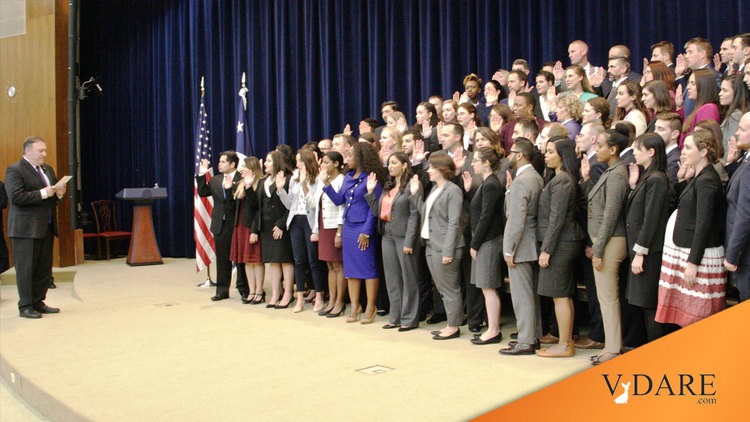
07/18/2022
As part of the Not So Great Reset of lowering standards in the 2020s, the State Department is going to make it easier for the racially privileged to be hired as foreign service officers.
One of the curious factors of American life is that some institutions managed to hold out at least until the Death of George Floyd at lowering their standards in the name of the Diversity.
Way back in January 1981, the outgoing Carter Administration surrendered to the Luevano discrimination lawsuit, agreeing to trash the state of the art PACE civil service hiring exam on the grounds that the incoming Reagan Administration would surely be able to come up with a test that had both predictive validity yet no disparate impact by race. Good luck, Reaganites!
Over 40 years later, that still hasn’t happened. It’s almost as if it can’t be done.
But some elements of the federal government held out, such as the Foreign Service, which kept requiring job applicants pass the Foreign Service Officer Test.
From Federal News Network:
State Department rethinks how it vets Foreign Service candidates to diversify ranks
Jory Heckman @jheckmanWFED
June 10, 2022 9:58 amThe State Department is making the biggest change in decades to how it screens applicants seeking to join the Foreign Service.
The agency, starting this month, will no longer use Foreign Service Officer Test (FSOT) scores as the sole criteria for who moves on to the next steps of the selection process.
All Foreign Service applicants will still take the written test, but the State Department will no longer treat the FSOT as a “pass/fail gateway.”
Instead, qualification evaluation panels will instead take a candidate’s personal narrative statements, and their background and qualifications — as well as their FSOT score — into consideration, to determine who will move on to the oral exam stage of the selection process.
State Department officials, as part of a broader modernization of the agency, expect these changes will help diversify the incoming ranks of the Foreign Service.
Holistic hiring, if you will.
An association representing Foreign Service officers says it generally supports reforming Foreign Service hiring, but still has questions about how the agency will use artificial intelligence tools to vet candidates.
Mica Schweitzer-Bluhm, director of recruitment in the department’s Bureau of Global Talent Management said these changes will provide a more holistic view of candidates.
“It ensures that all applicants can present a full picture of their individual qualifications,” Schweitzer-Bluhm said in a recent interview.
The department said these changes mark the most significant overhaul to the Foreign Service evaluation process since 1930. …
Brian McKeon, the deputy secretary of state for management and resources, told the Senate Foreign Relations Committee last month that the department expects these changes will increase the diversity of incoming Foreign Service classes.
“Some people don’t take tests well. Some people have the resources to take courses to help them pass the written test. So we want to make sure that we are not screening out qualified officers by just the written test,” McKeon said during a May 3 hearing.
McKeon said he failed the Foreign Service exam in the 1980s.
“I came out OK, so not everybody can pass the test,” McKeon told the committee.
… The American Foreign Service Association generally supports these changes, but seeks greater transparency into the agency’s use of artificial intelligence tools to assess candidates.
“The AI will make the first cut now, since the exam is no longer the first cut, because there’s no longer a passing score,” Rubin said. “This is not all new, and we’re not necessarily opposed to it, but we do think there needs to be more explanation of how this is going to work.”
The Foreign Service receives as many as 20,000 applications a year, but Rubin said in recent years, it’s been receiving about 6,000 applications a year.
“But even 6,000 is too many for people to individually review,” he said.
Once the AI algorithm screens candidates, Foreign Service examiners, made up of active-duty members of the Foreign Service and outside public members, will review the remaining candidates and decide who goes forward with the oral exam.
Rubin said AFSA still has unanswered questions about how the algorithm from a third-party contractor will assess candidates.
I’m sure that adding an AI element to the hiring process will increase diversity. I mean, whoever heard of a robot being racist? Robots don’t have eyes so they can’t see what skin color an applicant has.
… Once a Foreign Service officer makes it through their probationary period, which about 98% of them do, Rubin said they’re permitted to serve for 27 years, unless there’s a problem with their performance.
It’s a nice job.
… The State Department during the Biden administration has taken steps to address long-standing diversity challenges in the Foreign Service — as documented over decades by the Government Accountability Office and former Foreign Service officers.
Among its reforms, Secretary of State Antony Blinken appointed Ambassador Gina Abercrombie-Winstanley, a career employee with more than 30 years of experience, to serve as the agency’s first chief diversity and inclusion officer.
In this role, Abercrombie-Winstanley has been focused on studying the barriers that prevent diversity from flowing up to the Foreign Service’s top ranks.
There must be something completely idiosyncratic about why on average blacks don’t score well on the Foreign Service test. Whoever heard of that being true with any other test or career?
The department has also expanded its Thomas Pickering and Charles Rangel fellowships to bring more diverse talent into the Foreign Service.
In some cases, however, there’s been institutional resistance to these changes.
AFSA, in an article last year, said some Foreign Service officers selected through the Pickering and Rangel fellowship conceal this information, “for fear that their colleagues will treat them as back-door entrants — not real FSOs.”
This is a content archive of VDARE.com, which Letitia James forced off of the Internet using lawfare.